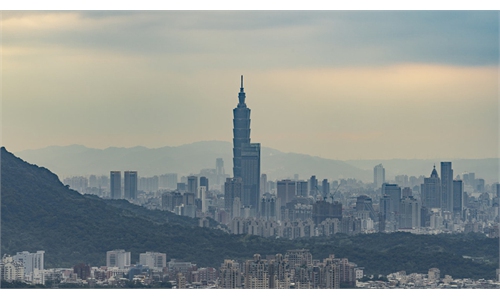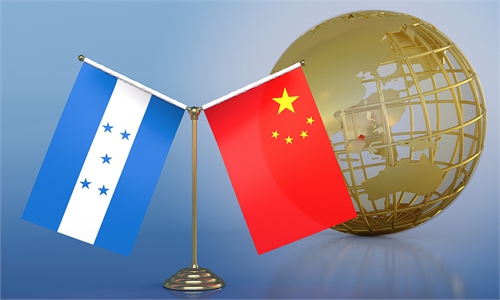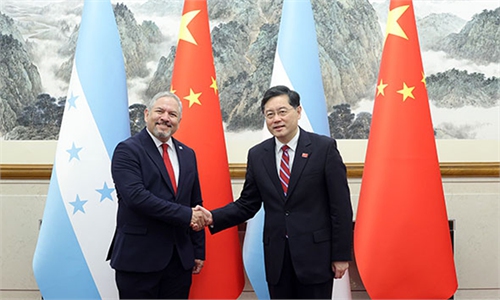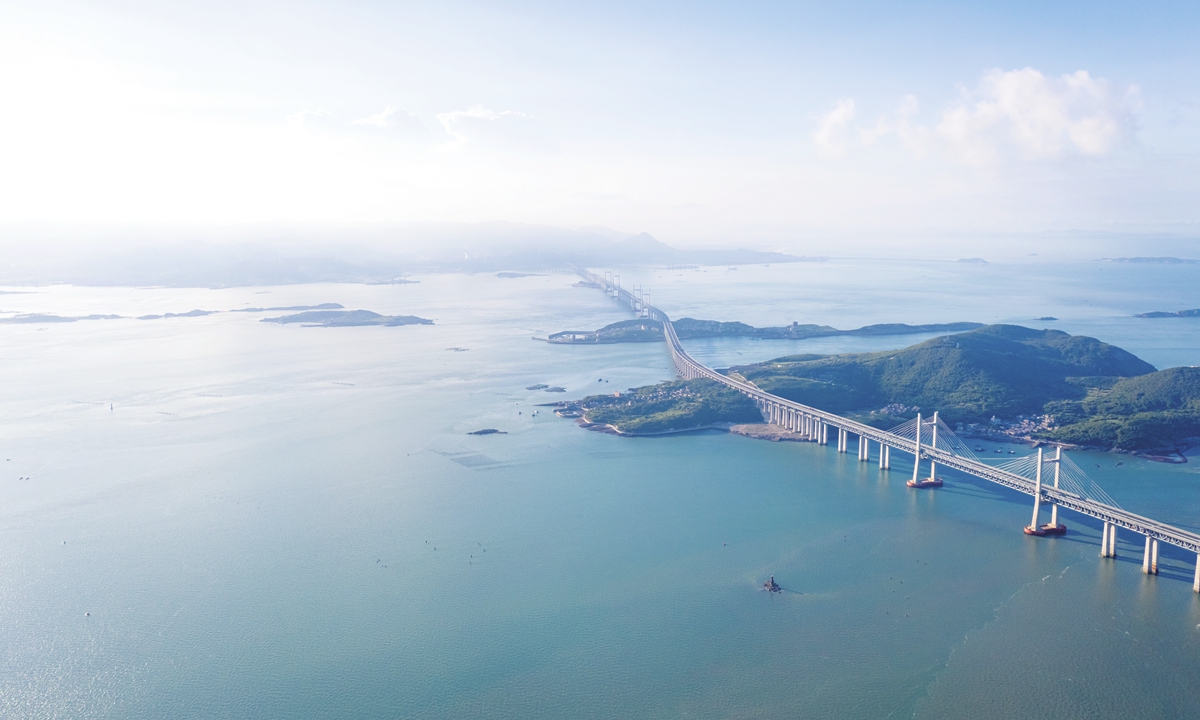
A view of Pingtan Strait Road-rail Bridge in East China's Fujian Province. Photo: VCG
Editor's Note:Former Taiwan regional leader Ma Ying-jeou will pay respects to his ancestors on the Chinese mainland starting March 27, becoming the first former Taiwan regional leader to visit the mainland since 1949. Hsiao Hsu-tsen (Hsiao), the Director of the Ma Ying-jeou Foundation, recently accepted an exclusive interview with the Global Times (GT). Hsiao, who has been working with Ma for many years, said that Ma hopes this trip can ease the current tense cross-Straits relations and bring peace to the Taiwan Straits again.
GT: One of the themes of Ma's visit this time is to pay respects to his ancestors. Since you have worked closely with him for many years, has he told you how he has imagined his hometown?
Hsiao: Ma's hometown is Hunan Province, which is also hometown of his parents. They met in 1944 while studying at the Central Political School in Chongqing. Ma has been unable to visit his hometown because of his work, but his elder sister has always kept in touch with their local relatives. This time, Ma arranged to go back to his hometown to pay his respects to his ancestors and fulfill his long-cherished wish.
Ma is very filial and attaches great importance to his ancestral traditions. He often mentions his grandfather Ma Li'an's family mottos: "Gold is not a treasure, books are; all things can be empty, but not kindness." Ma Li'an couldn't go to school when he was young, but later worked his way up and ran businesses, including a cast iron pot factory. As his businesses grew, he continued to build bridges and roads for the local community and donated to schools, thus earning the title "Kind House."
These two family mottos are still in Ma's office today so he can remind himself to do good deeds and accumulate virtue, adhere to moral integrity and the rules, and be low-key, simple, and strict with himself. After Ma took office, his wife, Chow Mei-ching, and his relatives quit their jobs successively, while his two daughters did not cause any controversy. Ma has always lived in an old apartment on Hsing-Long Road in Wenshan District, Taipei. He has no luxury houses.
GT: Ma will visit Zhounan Middle School and Yueyun Middle School, his parents' alma mater. How did Ma decide on the places he would visit?
Hsiao: Ma has been hearing his parents talk about their time at the school since he was a child. With these memories deep in his heart, he wanted to visit his parents' alma mater during this trip to pay respects to his ancestors. It is human nature for Ma to choose the Qingming Festival to do this, not out of some special consideration. He planned the trip long ago.
The Chinese nation has always had the tradition of visiting their hometowns to sweep the tombs during the Qingming Festival. I live in Nantou County in Taiwan, and I will also visit my hometown during the Festival. If someone does not allow me to go back, I will definitely resist, and politics should not override humanity!
GT: Ma's visit will include many historical relics related to the War of Resistance against Japanese Aggression. Why is he so interested in this period of history? Is this in line with Ma's doctoral thesis on the Baodiao (Defend the Diaoyu Islands) movement?
Hsiao: Out of all Taiwan leaders, Ma is the one who has paid the most attention to the history of the anti-Japanese War. He attaches great importance to it because, first, it was a battle for the survival of the Chinese nation, and Ma has deeply borne the resistance against foreign invasion in his mind. Second, he was influenced by his mother's national education, as Ma grew up listening to his mother's stories about the anti-Japanese War and how they managed to escape. This is a way to remember these lessons.
When it comes to these stories, Ma often talks about the Battle of Yenangyaung in 1942, where regiment commander Liu Fangwu saved 7,000 British soldiers. Later, former British Prime Minister Margaret Thatcher made a special trip to the US to visit Liu in his later years [Note: in 1992, the 93-year-old Liu was living in California].
In addition, Ma often holds commemorative meetings on the anti-Japanese War. In 2015, the 70th anniversary of the War of Resistance against Japanese Aggression, he organized several important events and presented anti-Japanese War victory medals to veterans who fought in the war. When those veterans received the medals with tears streaming down their faces, Ma also choked up.
Ma also found the grandson of John Rabe and awarded him a commendation for protecting Chinese soldiers and civilians and recording the atrocities of Japanese troops during the Nanjing Massacre. Ma said that the anti-Japanese War was the most deadly battle for the Chinese people and military, and although we need to maintain friendly relations with Japan, we cannot forget this history. So when Ma goes to the mainland this time, he will include visits to several relics related to the anti-Japanese War in his schedule so that the young people of Taiwan will not forget the contributions of these vanguards and martyrs made to the country and the nation.
Over the past few years, Ma often took students from the "Da Jeou Academy" to visit the historical sites of Taiwan's anti-Japanese resistance, including those of the Tapani incident in 1915 and the Musha Incident in 1930, so that Taiwan's young people can also learn that martyrs on the island of Taiwan once fought a bloody war against Japanese aggression. It can be said that Ma has maintained considerable contact with the descendants of the heroes in the anti-Japanese War. But the Democratic Progressive Party (DPP) has never talked about these things.
GT: The second major theme of Ma's visit is cross-Straits youth exchange. Can you tell us more about the "Da Jeou Academy"?
Hsiao: After the establishment of the Ma Ying-jeou Foundation, we have been thinking about what we should do. We later decided to work with young people, because Ma still has considerable appeal to them.
Students who want to enter the "Da Jeou Academy" will go through a certain selection process. We choose students who are enterprising and willing to learn and can actively interact with each other, including undergraduates, graduates and postgraduates, with an almost equal amount of male and female students. At present, we only accept Taiwanese students.
At the beginning, we held camps, picking a longer time during the summer vacation or a two-day, one-night trip during spring break. Ma personally took the students to visit various places and learned more about Taiwan and its history to experience a "Chinese" connection that cannot be found in textbooks.
Now, after three sessions, the young people of the "Da Jeou Academy" are more aware of many things about Taiwan and are more willing to participate in related activities, so this time Ma also wants to take young people to the mainland for exchanges. He believes that the current cross-Straits hostility is increasing, making it easier to lead to a minor incident that can spark a conflict.
When COVID-19 had just hit the mainland, Taiwan was unwilling to donate masks to the Chinese mainland, which hurt the feelings of people on both sides of the Straits a lot. Ma is very worried about the development of this situation. He no longer holds public office, so he cannot change the current policy. But he still has the energy to take young people for exchanges, makes every effort to reduce cross-Straits tensions, and communicates with young people on the mainland so that the two sides can get to know each other and restart exchanges. In doing so, the two sides of the Taiwan Straits can regain peace.
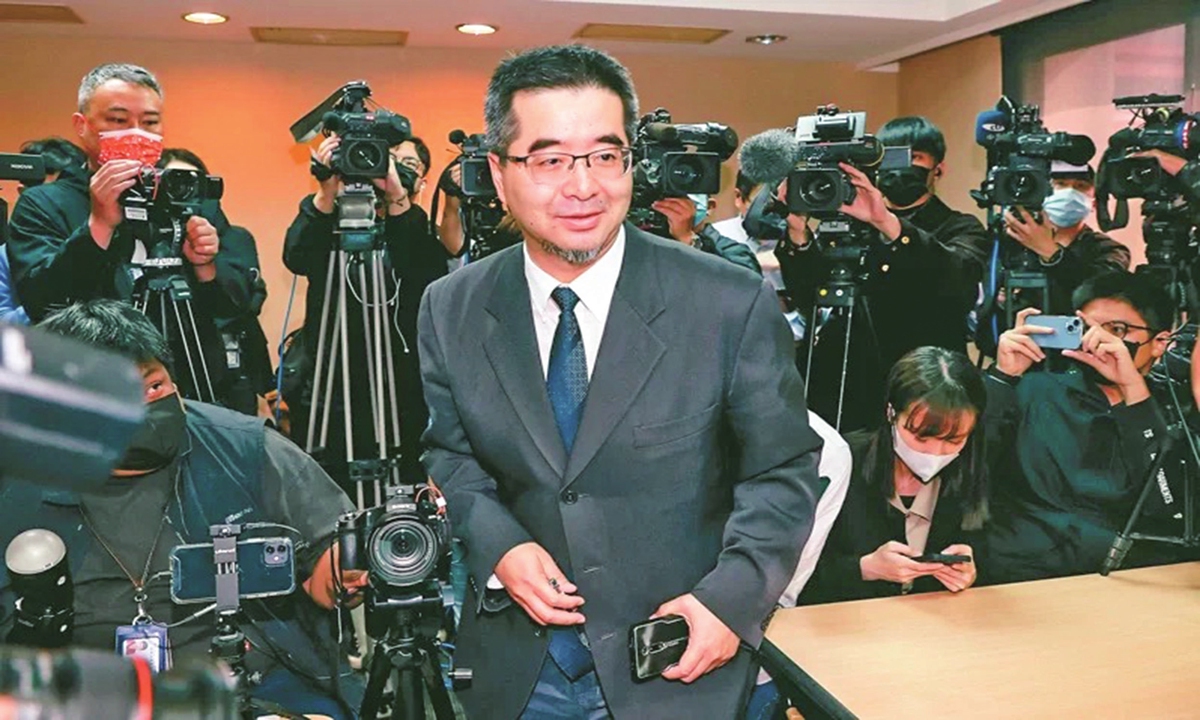
Hsiao Hsu-tsen Photo: Courtesy of Hsiao
GT: After Ma's mainland visit was announced, some people in the "green camp" gave him a "red hat." What does Ma think about this?Hsiao: Ma is not afraid of being put on a "red hat." Over the years, he has been the DPP's target for shifting blame. Last year, the cross-Straits situation gradually changed with the outbreak of the Russia-Ukraine conflict and then US House Speaker Nancy Pelosi's visit to Taiwan. These have led to a huge increase in cross-Straits tensions and a slow shift in public sentiment. Many asked, "Do we really want to go down this road (to war)?" We propose different options from the DPP and are not afraid of being put on "red hat." We want to ask the DPP. "What is your solution to cross-Straits relations?"
GT: How did the Kuomintang (KMT) react to Ma's mainland visit? Is anyone worried about the impact on next year's election?
Hsiao: Some people within the KMT initially didn't approve of it, and also worried that Ma's visit would affect the 2024 election. But after our detailed explanation, there are no more opposing voices, and KMT Chairman Eric Chu also expressed his blessing and support. I would be speechless if someone still claimed that the schedule would affect the election. I think this trip is positive, and the KMT should not be afraid. We should believe that we can bring peace across the Taiwan Straits, otherwise, how can the people trust the KMT's policies? We need to strengthen fostering young people and keep discussing cross-Straits relations and energy policies so that more people know the truth and the direction that really benefits Taiwan instead of being led by the nose by the DPP.
GT: Now, there is also discussion on Taiwan island about Ma's position in history. How did he personally position himself in the development of cross-Straits relations?
Hsiao: The position that someone holds in history is an evaluation by others. The positive interaction between the two sides of the Taiwan Straits was an important achievement during Ma's term of office. First of all, we achieved the establishment of institutionalized mechanisms across the Taiwan Straits. From the meeting of the Straits Exchange Foundation and the Association for Relations Across the Taiwan Straits, to the meeting of the heads of the Mainland Affairs Council and the Taiwan Affairs Office of the State Council, to the meeting of the leaders of both sides of the Taiwan Straits, all these were achieved gradually and step-by-step. Establishing institutionalized mechanism is the only way to avoid many risks that can trigger conflicts and deal with complex issues slowly.
During the Ma administration, 23 cross-Straits agreements were signed, covering various issues. With these basic structures, the two sides of the Taiwan Straits can interact to tackle the problems well. For example, when the COVID-19 epidemic broke out in early 2020, the two sides of the Taiwan Straits were able to handle the vaccine and mask issues under the medical agreement. Another example is that there are also agreements to deal with the recent dispute over quarantine inspections for agricultural and fishery products. Ma established these mechanisms, but unfortunately, the DPP has done nothing.
I believe that out of the leaders in Taiwan island in the past few years, Ma opened the door between Taiwan and the mainland and pushed for comprehensive exchanges to promote cross-Straits peace, while Tsai Ing-wen led Taiwan into a dangerous situation. The British and US media are now greatly touting Tsai based on self-interest in confronting the mainland, but history will eventually expose Tsai's problems. The two sides of the Taiwan Straits must never go to conflict in the future. Ma has laid the foundation for the Big Three Links across the Taiwan Straits, and at this critical moment, he is willing to play the role he intends to and has played.
GT: Tsai's office said that Ma is required to report details of his mainland visit's itinerary. What do you need to report for this trip?
Hsiao: We have reported the itinerary, and when we return to Taiwan, we can fill out the form and check it off. The DPP always says that Ma's trip to the mainland is a "betrayal of Taiwan." But since Ma has no official position, how can he betray Taiwan? Only those in power can sell out Taiwan's interests.
Ma likes to jog, so we will arrange some morning exercise every day of the trip. But it also depends on the mainland's security arrangements. As for me, I am very much looking forward to every destination on this trip.
